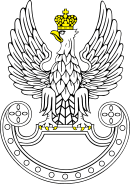Battle of Hodów
| Battle of Hodów | |||||||
|---|---|---|---|---|---|---|---|
| Part of the Polish–Ottoman War (1683–1699) | |||||||
| |||||||
| Belligerents | |||||||
|
|
| ||||||
| Commanders and leaders | |||||||
|
| unknown | ||||||
| Strength | |||||||
| 400[1][2][3] | ~40,000[4][5] | ||||||
| Casualties and losses | |||||||
| Fewer than 100[6][7] | 1000–2000[8] | ||||||
The Battle of Hodów was a battle between the Kingdom of Poland and Crimean Khanate forces, fought in June 1694 in the Ruthenian Voivodeship of the Crown of the Kingdom of Poland, near the village of Hodów (now in Zboriv Raion, Ternopil Oblast, Ukraine). Often it is called Polish Thermopylae, like the Battle of Wizna.
Prelude
In June 1694 Tatar Muslims forces invaded Polish territory with the aim to pillage the countryside and capture prisoners for ransom. The Polish forces sent to stop them consisted of 7 chorągwie of hussars and pancerni from Okopy Świętej Trójcy and Szaniec Panny Marii strongholds, approximately four hundred men in total;[9] historian Mirosław Nagielski estimates 100 hussars and 300 pancerni.[10] Tatar numbers were estimated at twenty-five to seventy thousand, with forty thousand being the most commonly quoted figure.[11] Also, John III Sobieski, the king of Poland at the time, mentioned the figure of forty thousand.[12]
Battle
The first encounter took place on the fields near Hodów. The Polish cavalry charged the 700-strong Tatar vanguard and made them withdraw. Shortly afterwards Polish forces retreated to Hodów village due to overwhelming enemy numbers, and proceeded to fortify themselves using heavy wooden fences left there from earlier Tatar invasions. For the next 6 hours Polish troops resisted relentless Tatar attacks. Even after the Polish ran out of bullets, they continued to fire at the enemy, using Tatar arrows as improvised ammunition for their guns.[13]
Aftermath
Unable to defeat the Poles, Tatars sent Polish-speaking Lipka Tatars to convince the Polish troops to surrender.[14] When the Polish commander refused, the Tatars withdrew to Kamieniec Podolski and gave up on the entire invasion, having gained nearly nothing despite large troop numbers.
Notes
King John III Sobieski made use of this outstanding victory to raise army morale: he paid generous compensation to those who lost their horses, financed treatment of wounded and rewarded those who captured enemy soldiers. In 1695 he also commissioned a statue commemorating the battle. This monument survived into modern times and was renewed in the summer of 2014, then officially unveiled during the celebration of 320th anniversary of the Battle, on 25 October 2014.[15]
See also
References
- ↑ J.Wimmer. Materiały do zagadnienia organizacji i liczebności armii koronnej w latach 1690–1696. In: Studia i Materiały do Dziejów Wojskowości. 1963, tom IX/1, pp. 237–275.
- ↑ Mirosław Nagielski Hodów 1694-2014. Ostatnie zwycestwo husarii w dawnym stylu Bellona 1/2015, pp. 229-233
- ↑ Sikora R., Niezwykłe bitwy i szarże husarii, Warszawa 2011.
- ↑ Mirosław Nagielski Hodów 1694-2014. Ostatnie zwycestwo husarii w dawnym stylu Bellona 1/2015, pp. 229-233
- ↑ Sikora R., Niezwykłe bitwy i szarże husarii, Warszawa 2011.
- ↑ Mirosław Nagielski Hodów 1694-2014. Ostatnie zwycestwo husarii w dawnym stylu Bellona 1/2015, pp. 229-233
- ↑ Sikora R., Niezwykłe bitwy i szarże husarii, Warszawa 2011.
- ↑ Mirosław Nagielski Hodów 1694-2014. Ostatnie zwycestwo husarii w dawnym stylu Bellona 1/2015, pp. 229-233
- ↑ Sarnecki K., Pamiętniki z czasów Jana Sobieskiego, tom 1, opr. J. Woliński, Wrocław 2004.
- ↑ Mirosław Nagielski Hodów 1694-2014. Ostatnie zwycestwo husarii w dawnym stylu Bellona 1/2015, pp. 229-233
- ↑ Poznajemy. Bitwy polskie, Polen 2011.
- ↑ Sikora R., Niezwykłe bitwy i szarże husarii, Warszawa 2011.
- ↑ Sikora R., Niezwykłe bitwy i szarże husarii, Warszawa 2011.
- ↑ Mała Encyklopedia Wojskowa, p.r. J. Bordziłowski, tom. 1, Warszawa 1967
- ↑ Report from the celebration of the 320th anniversary of the Battle of Hodów and the unveiling of renewed monument of the Battle, Embassy of the Republic of Poland in Ukraine, 3.11.2014
External links
- "Hodów 1694 - Kresy - Portal Społeczności Kresowej". kresy.pl. Retrieved 18 June 2017.
- http://www.konflikty.pl/a,4291,Wczesna_nowozytnosc,Polskie_Termopile_1694._Bitwa_pod_Hodowem.html with additional references
- Winged Hussars, Radoslaw Sikora, Bartosz Musialowicz, Business Ukraine Magazine, October 2016.


